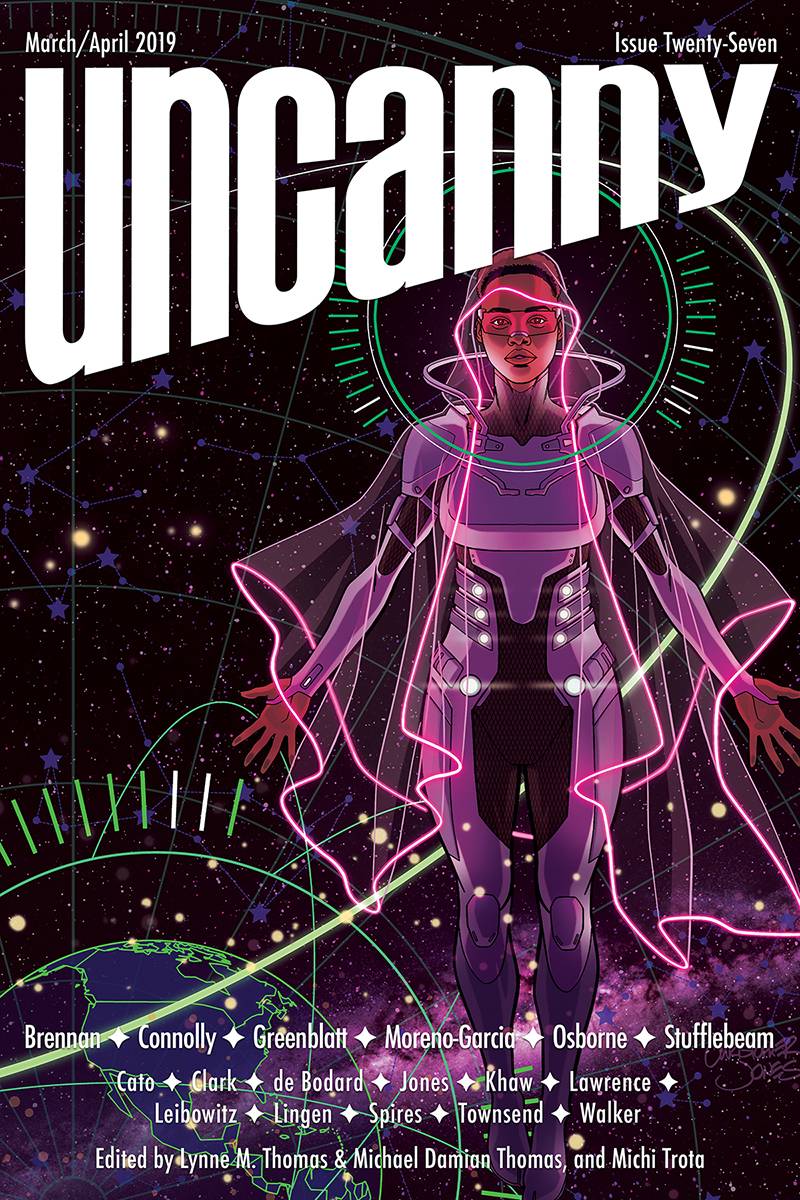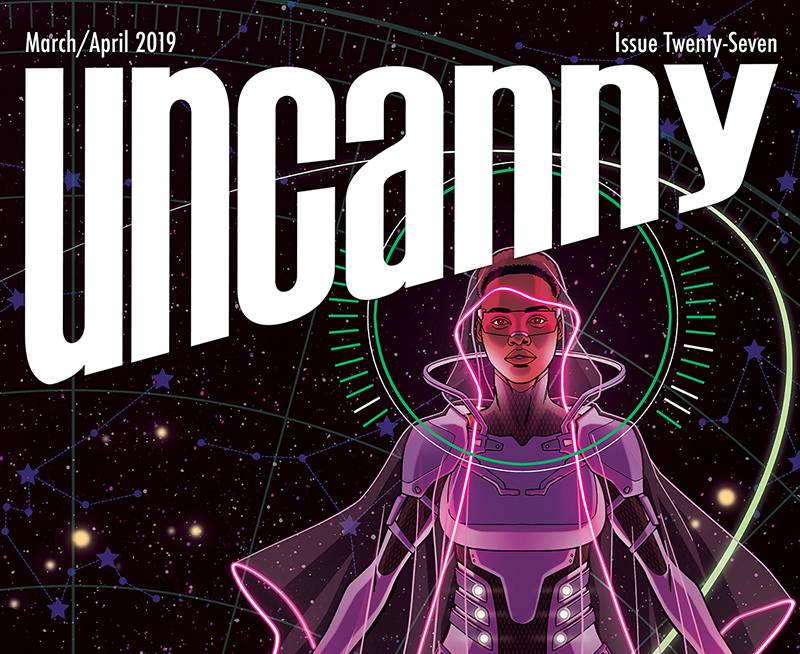Like many, my relationship with science fiction and fantasy (as art forms, as escapism, as food for a greedy imagination) began with “Star Wars: Episode IV – A New Hope”. Aside from lightsabers, Vader and the Falcon, the Mos Eisley Cantina and all its scummy, villainous denizens really drew me in. The movie also served as a gateway to wider cultural worlds and set me off on my own explorations of these worlds and the communities devoted to their creation, maintenance and worship.
In my ‘tweens and early teens, this exploration primarily involved the novels of the “Star Wars Expanded Universe” and the exploits of Grand Admiral Thrawn, Mara Jade and the Butcher of Montellian Serat, all fictional personnages that I still hold dear today (regardless of their canonical (non)-stature. Damn you, Disney!). High school involved a mild obsession with Tolkien and my collegiate “due diligence” included movies like “Children of Men”, “The Thing” and “Akira” and novels like “A Canticle for Liebowitz”, “Hard-Boiled Wonderland and the End of the World” and the ouevres of Thomas Pynchon and Kafka. These days, China Miéville’s worldbuilding, a funny and weird series of graphic novels called “The Manhattan Projects” and Denis Villeneuve’s forays into sci-fi all continue to help inform my worldview and illustrate the many ways that people dream and fantasize and imagine and express our discontent at humanity’s frail ephemerality and our need to escape the mind-numbing and often excruciatingly depressing realities of “the day-to-day” while also championing what is best about life, in all its forms, across the boundaries of space and time.
While most of my sci-fi and fantasy consumption is guided through reviews on Goodreads or Letterboxd, I occasionally have the good fortune of being introduced to smaller outlets sharing the work of lesser known creators. Such is the case of the latest issue of Uncanny Magazine, a Hugo and Parsec Award-winning online Science Fiction and Fantasy magazine that features “passionate SF/F fiction and poetry, gorgeous prose, provocative nonfiction, and a deep investment in the diverse SF/F culture”. Created in 2013 and edited by Urbana couple Lynne M. Thomas (who is also the Juanita J. and Robert E. Simpson Rare Book and Manuscript Professor at UIUC) and Michael Damian Thomas, Uncanny is a bimonthly treasure trove of short stories, poems, nonfiction essays and interviews as well as a monthly podcast that offers audio versions of select stories, poems, and interviews.

After hopping around the issue and reading a few stories and poems, I was struck by a subtle sense of kinship that permeates the publication and helps weave the disparate tales and explorations into a cohesive whole. The stories are all wildly different from one another, but you often get the sense that each is written in part as homage to the author’s influences and part as contribution a greater, ongoing dialogue. And from the opening editorial, it is clear that the contributors to Uncanny as well as its wider community of readers (known as the “Space Unicorn Ranger Corps”) believe in the power of stories. They also believe that it is worth fighting for what you believe in, that dreaming is essential and that “[t]here is always more kindness, art, beauty, and love coming—even when things feel oh so bleak”.
In Issue Twenty-Seven, these core values, kindness, art, beauty and love, are presented and examined from a variety of perspectives. In Tracy Townsend’s “Courage to the Sticking Place: Connecting SF/F Students with Creators”, kindness manifests itself in a teacher who helps connect her students with working writers as a way to inspire the courage and creativity necessary to really learn while also fostering the ability to see and respect these traits in the world around them.
By creating these opportunities, Townsend’s students get to meet the writers who inspire them and the creators are able to see the effects of their work, interactions which generate the requisite bravery for (continued) learning and exploration. I liked this essay especially because it emphasized that kindness is strength and that learning is a type of exploration that takes some nerve. It reminded me of that old chestnut from “The Lord of the Rings”, where Bilbo advises Frodo, “It’s a dangerous business, Frodo, going out your door. You step onto the road, and if you don’t keep your feet, there’s no knowing where you might be swept off to.” The author of this essay seems to feel similarly about learning (something more teachers might do well to feel, too).
There is also a lot of meditation on love and loss and the nature of relationships, perhaps none more thought-provoking than Bonnie Jo Stufflebeam’s “Every Song Must End”. The story, which is divided into episodes each titled with the names and artist information of different songs, is about an intersection in the amorous explorations of two couples. It is also about establishing a colony on Mars. Read it to find out how those two storylines converge.
In addition to portraying the idea of open relationships as a means to physical, emotional and even spiritual fulfillment, “Every Song Must End” also deals with how complicated (and draining) finding fulfillment can be. On this topic, Stufflebeam, through her couples, offers a number of prescient (and slightly world-weary) observations. One line, in particular, stands out:
“She didn’t want to need anyone, and she was older now than she had been then in her aching youth, her heart less elastic. She was no longer able to pick herself up so easily from the floor. She would need her husband to help her up, to hold her, to come running when she called his name from the room where she would inevitably curl up crying. He promised her that: comfort when she needed it. She clung to his promise.”
 “Every Song Must End” is a unique and memorable take on the thrill of new-love-as-exploration, the sadness when that exploring has to stop, the comfort and strength that a loyal exploration partner can provide and how you can take a trip in your mind that is just as real, if not more so, than any physical journey.
“Every Song Must End” is a unique and memorable take on the thrill of new-love-as-exploration, the sadness when that exploring has to stop, the comfort and strength that a loyal exploration partner can provide and how you can take a trip in your mind that is just as real, if not more so, than any physical journey.
Finally, there is an abundance of creative storylines and beautiful prose in the pages of this newest issue of Uncanny. Karen Osborne’s “The Dead, in Their Uncontrollable Power”, the first story in the issue, is a gritty and gory tale of religious and social upheaval set on a wayward colony ship in search of a lost paradise. In addition to highlighting the duplicity often employed by those in power in order to stay power, it asks the reader (through the use of an ingenious technological conceit) to consider being force-fed the memories of your enemies. In her story “Vīs Dēlendī”, Marie Brennan deftly blurs the lines between obsession and passion and life and death in the tale of an upstart pupil who, while trying to gain the respect and acceptance of his teachers, grapples with an all-consuming power in an attempt to bend reality to his will. And maybe the most beautiful combination of form, language and imagery is Beth Cato’s poem, “Childhood Memory from the Old Victorian House on Warner”. Short, surreal and shocking, its personification of light, shadow and wallpaper reads like something Kafka might have written while reminiscing about his youth.
Through the art and discourse that it shares with the world, Uncanny Magazine has garnered much acclaim. After reading the latest issue, it is easy to see why. It is an outlet for people who take science fiction and fantasy seriously as ways to transcend, transform and improve upon our reality. It is also the focal point of a wider community of people whose enthusiasm and interest help these genres evolve. As a community, Uncanny, its contributors and all the loyal Space Unicorns out there have created a space where people from different walks of life can share their experiences and the characters, stories and ideas that populate the worlds inside their heads. By showcasing the end results of this process of experiencing, creating and sharing, we readers are gifted with a variety of examples illustrating that sometimes making up a story is the best way to tell the truth.
Issue Twenty-Seven of Uncanny Magazine is out now. You can purchase access on a wide variety of platforms via https://uncannymagazine.com/ In addition to full access, several pieces from this issue (including audio versions) as well as stories, poems, essays and interviews from previous issues are available for free via the above link.
Photos from Uncanny Magazine








